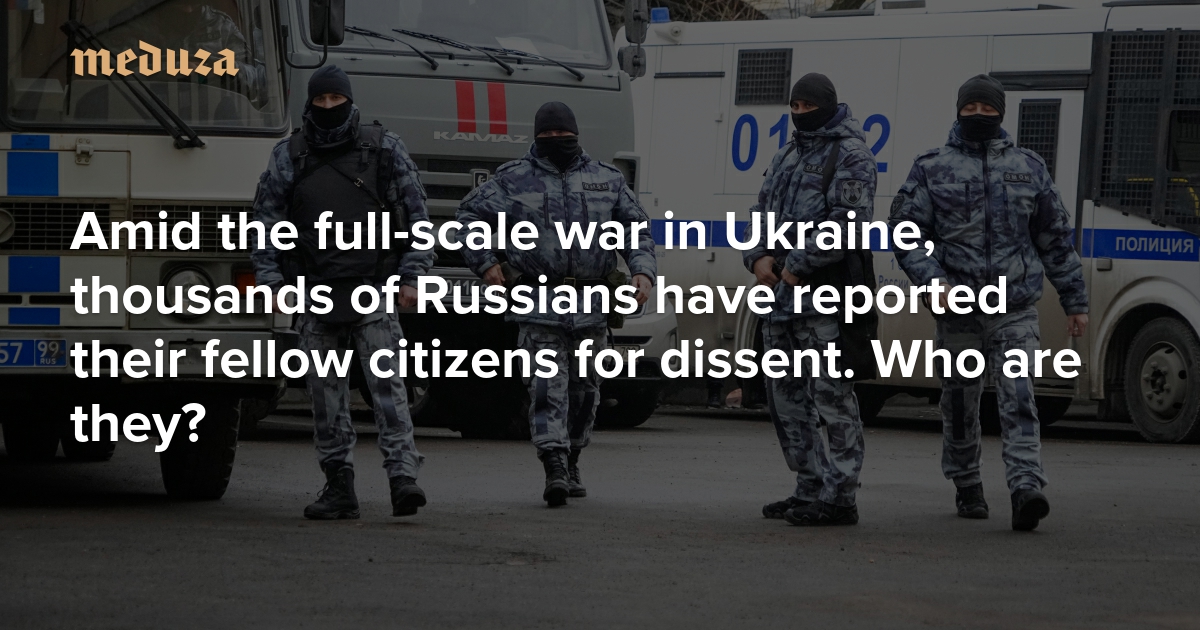- cross-posted to:
- news@lemmy.world
- cross-posted to:
- news@lemmy.world
Since the start of the full-scale war against Ukraine, Russians have filed at least 3,500 denunciations against their fellow citizens for their statements, posts, books, and websites — sometimes resulting in high-profile criminal cases. However, the consequences of most of these complaints receive little public attention. Furthermore, many of those filing reports are not public figures but ordinary Russians who meet in anonymous Telegram channels. The independent outlet iStories analyzed the most active of these informant channels and interviewed their members to uncover who they are, what they report, and why they choose to participate in state repression. This is an English translation.
Late last year, Moscow resident Usman Baratov posted a picture of a chicken with the caption: “No eggs for you! Bring the cocks back from the front.” His post was a reaction to the sharp rise in egg prices (over 50 percent), a topic even Vladimir Putin had to address.
Within a month, calls to strip Baratov of his Russian citizenship started appearing on social media. Pro-Kremlin bloggers saw his post as “discrediting” the Russian army, and informers joined the harassment, sending complaints about Baratov to the Russian Investigative Committee and the prosecutor’s office.
One of the most active voices calling for denunciations against Baratov was the anonymous Telegram channel Direct Action. The channel, aiming to “create public outcry,” asked followers to report Baratov to pro-government media in order to ensure he “was no longer laughing.” A few days later, a criminal case was opened against him on charges of “inciting hatred or enmity.” Baratov has now been in pre-trial detention for five months. Thanks to Direct Action, he faces up to six years in prison.
- The 3,500 complaints against Russian citizens is only a minimum estimate based on public posts. The most active groups of anonymous informers emerged only after the start of the full-scale war. Before that, they existed as groups on Russian social media where people would share propagandistic and homophobic memes.
- One of these groups, Direct Action, spun off from a group called Bloodseeker, which posts homophobic and pro-Kremlin content. However, the war and the subsequent repressive policies brought by Russian authorities against their own population led to a surge in denunciations, targeting not only anti-war statements but also LGBTQ+ content, “Russophobia,” drugs, and other topics.
- For serial informers like Ekaterina Mizulina, the head of the Safe Internet League, and Vitaly Borodin, the head of the Federal Security and Anti-Corruption Project, denunciation has become a calling card. Mizulina alone filed 148 reports over just two years, targeting bloggers, journalists, publishers, artists, and other content creators. Lawmakers and activists like this tailor their denunciations to their current agenda, primarily focusing on public figures and their statements.
- In addition to calls for denunciations, these Telegram channels urge followers to harass and spam victims. This June, informants complained about people holding a “photo shoot” in a St. Petersburg cemetery. Channel administrators created dedicated chats to instruct followers on the types of comments to leave on the targets’ social media pages and which posts to report.
- Followers often report back on their successes. By June 7, 2024, members of Direct Action claimed to have blocked 109 pages related to LGBTQ+ topics and the war in Ukraine, including opposition media sites (although it’s not possible to verify whether these pages were blocked as a result of these informants). They also boast about forced public apologies (such as a Belgorod resident’s for supporting Ukraine and criticizing the mistreatment of migrants in Russia), dismissals (like the Higher School of Economics firing a transgender teacher in spring 2022), and misdemeanor charges (including those against Popcorn Books for publishing books with LGBTQ+ characters and a drag performer from Yekaterinburg for singing the Russian anthem while holding a rainbow flag).



Compensatory sadism as an olympic discipline.